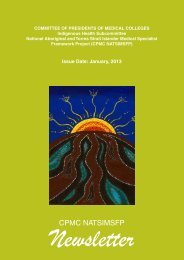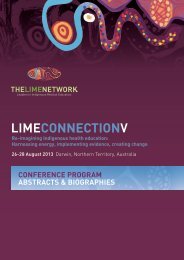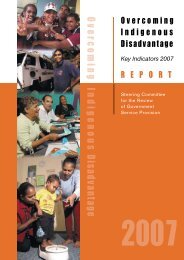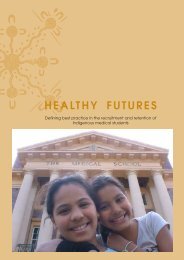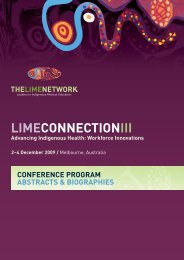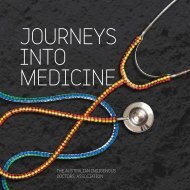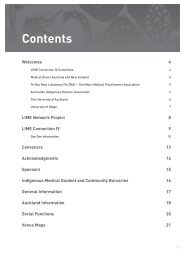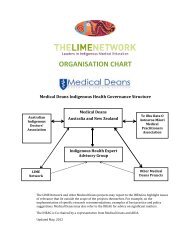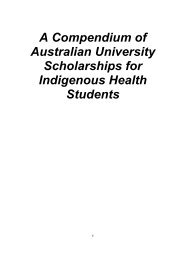View - LIME Network
View - LIME Network
View - LIME Network
Create successful ePaper yourself
Turn your PDF publications into a flip-book with our unique Google optimized e-Paper software.
Heads of Agreement (HOA)An equal partnership between the National Aboriginal Community Controlled HealthOrganisation (NACCHO) and the Royal Australasian College of Physicians (RACP)Aboriginal and Torres Strait Islander Expert Advisory Group.Statement of IntentIt is the intent of the RACP through its Divisions, Faculties, Chapters and a partnershipwith NACCHO to assist in efforts to build the capacity of Aboriginal CommunityControlled Health Services (ACCHSs) through increasing their access to servicesprovided by physicians. Our partnership will be characterised by cooperation,collaboration, goodwill and the constant pursuit of excellence.The RACP and NACCHO are committed to the reduction in infant mortality andincreased life expectancy for Aboriginal and Torres Strait Islander peoples of Australia asset out in the “Statement of Intent”, 20 March 2008.We share a common belief that improved health outcomes for Aboriginal peoples will beachieved when Aboriginal and Torres Strait Islander peoples and their communitycontrolledhealth services are empowered to act on their own behalf, and whenAboriginal peoples’ reduced access to mainstream and Indigenous-specific healthresources is improved.Our work together will seek to provide the best social, economic and health outcomes forIndigenous Australians.Our activities will be conducted with respect for each organisation’s system of work,culture and values and will support the delivery of services being carried out in aneffective, efficient and integrated manner.The primary objectives of the partnership will be:• to improve health, social and economic outcomes for Aboriginal and Torres StraitIslander peoples and as a priority, cultural safety; and,• to facilitate a unique training experience for physician and paediatrician trainees.These objectives imply having a good understanding and empathy with local Aboriginalcommunity culture as well as an understanding of the impact of social conditioning(ethnocentrism, prejudice, stereotyping) and the health care environment (social context,institutional policies, power inequalities) on the quality of health care.1



